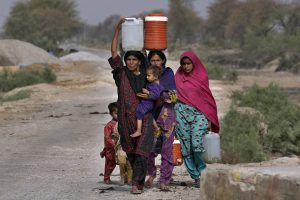Pakistan’s southwestern province of Balochistan has been facing significant security threats and political stability for many years. However, despite these challenges, the province has made remarkable progress in recent years.
The security situation has improved significantly. This improvement is due to the efforts of various stakeholders who have realized that listening to people’s voices is crucial in addressing the issues faced by the province.
The security situation in Balochistan has been a matter of concern for both the provincial and federal governments in Pakistan. However, some stakeholders in the province believe that the issue should not be described as an insurgency, as it does not accurately represent the views and aspirations of the wider Baloch population.
According to officials, a few hundred militants taking up arms against the state “cannot be considered a rebellion or insurgency.” Any description of security issues in Balochistan “must take into account the diverse perspectives and opinions of its people,” a government official told The Diplomat.
For instance, a female suicide bomber recently detonated a bomb on a police van in Turbat, raising concerns that this dynamic may affect the southern part of the province. Despite the disturbing development, people I spoke with from various districts of the province claim that this is an isolated case and linked to families involved in militancy in the province for decades.
The suicide bomber was reportedly a relative of a senior militant leader of the Baloch Liberation Army (BLA), which is an outlawed separatist group in Balochistan.
This is not the first time that such an incident has taken place. Last year, another female suicide bomber affiliated with the BLA, Shari Baloch alias Brimash, targeted Chinese nationals in Pakistan. It was later discovered that she was the wife of another militant leader who has been associated with BLA for many years.
“It is important to note that these are stand-alone cases and do not reflect the sentiments of the Baloch people as a whole,” a senior official told The Diplomat on condition of anonymity. “The majority of Baloch people are peaceful and law-abiding citizens who want to live in harmony with other communities,” the official said.
Balochistan is Pakistan’s largest province, covering approximately 43 percent of its total area. With its strategic location, mega port, and vast natural resources, the province has attracted the attention of world powers. Various development projects are being undertaken by the Pakistani leadership with the aim of uplifting the province’s socio-economic situation and harnessing the full potential of the region.
One such project is Reko Diq, a large copper-gold mining project that has the potential to boost the economy of not just Balochistan but also Pakistan as a whole. The Saindak Copper Gold Project is another initiative aimed at harnessing the mineral resources of Balochistan.
Furthermore, with the China-Pakistan Economic Corridor (CPEC) passing through Balochistan, it opens up new opportunities for investment and development in the province. In order to unlock the true potential of the project, the civil-military leadership understands that an enabling environment is essential and sees the support of Balochistan’s people as key in this endeavor.
That said, the people of Balochistan are deeply concerned about the current state of their political representation. For far too long, the decision-making positions have been held by people who are mostly tribal heads or Sardars. Many feel that these individuals are incompetent and unable to deliver on the needs and desires of the people they represent.
As a result, there is a growing call for honest and popular individuals who have public support to be given a place in decision-making positions. The people believe that those who truly understand their needs and concerns and act on them should have the opportunity to lead.
Balochistan’s political landscape needs to change, and the people themselves must demand that change. By advocating for more competent and responsive leaders, they can help ensure that their voices are heard and their needs are met.

































